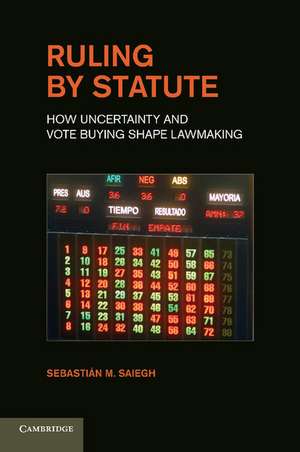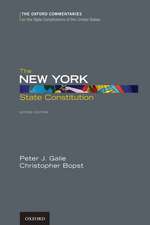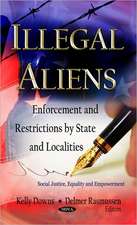Ruling by Statute: How Uncertainty and Vote Buying Shape Lawmaking
Autor Sebastian M. Saieghen Limba Engleză Paperback – 2014
| Toate formatele și edițiile | Preț | Express |
|---|---|---|
| Paperback (1) | 291.87 lei 6-8 săpt. | |
| Cambridge University Press – 2014 | 291.87 lei 6-8 săpt. | |
| Hardback (1) | 688.70 lei 6-8 săpt. | |
| Cambridge University Press – 24 apr 2011 | 688.70 lei 6-8 săpt. |
Preț: 291.87 lei
Puncte Express: 438
Preț estimativ în valută:
51.60€ • 60.82$ • 45.07£
51.60€ • 60.82$ • 45.07£
Carte tipărită la comandă
Livrare economică 09-23 aprilie
Specificații
ISBN-13: 9781107618008
ISBN-10: 1107618002
Pagini: 250
Ilustrații: 17 b/w illus. 15 tables
Dimensiuni: 152 x 229 x 14 mm
Greutate: 0.37 kg
Editura: Cambridge University Press
Colecția Cambridge University Press
Locul publicării:New York, United States
ISBN-10: 1107618002
Pagini: 250
Ilustrații: 17 b/w illus. 15 tables
Dimensiuni: 152 x 229 x 14 mm
Greutate: 0.37 kg
Editura: Cambridge University Press
Colecția Cambridge University Press
Locul publicării:New York, United States
Cuprins
Part I. Introduction: 1. Introduction; Part II. Theoretical Foundations: 2. On statutory policy making; 3. A model of statutory policy making under uncertainty; Part III. Empirical Implications: 4. Measuring chief executives' statutory performance; 5. Patterns of statutory policy making around the world; 6. Political prowess or 'lady luck'?; 7. Buying legislators; 8. Electoral rules and lawmaking; Part IV. Normative Implications: 9. The political gap; Part V. Conclusions: 10. Conclusions.
Recenzii
“This is an excellent book! It offers a theoretical explanation for a phenomenon that cannot be accommodated by existing models of legislative action: why democratic governments sometimes get defeated in the legislature (it has to do with uncertainty about legislators’ preferences). The theory developed in the book is brought to the data in a rigorous and creative way, with the use of multiple methods and datasets. The book contains many interesting and provocative claims, including the idea that vote buying is almost inherent to legislative action; that vote buying is often efficient; and that there area circumstances in which governments may rule too much. In short, Ruling by Statute is an important book that represents the best in political science.”
– José Antonio Cheibub, University of Illinois at Urbana-Champaign
“This outstanding book puts the study of executive-legislative interaction over lawmaking where it belongs: in a context of strategic interaction under uncertainty. This is a rich, wide-ranging and eye-opening analysis of a topic that is central to understanding how democracies work.”
– William R. Keech, Duke University
“In Ruling by Statute, Sebastian Saiegh challenges the conventional wisdom concerning law making that either agenda-setting powers and/or partisan whipping and voting cohesion are essential to a chief executive's power to make law. Instead, relying on positive political theory, statistical analysis, and country case studies, Saiegh provides a major advance in our understanding of how inter-branch bargaining affects lawmaking, showing, for example, that the unpredictability of legislators’ voting behavior is actually key in limiting or shaping a chief executive’s ability to successfully enact new laws. This book should be on the reading list in every course on democratic theory or comparative politics.”
– Matthew D. McCubbins, University of Southern California
– José Antonio Cheibub, University of Illinois at Urbana-Champaign
“This outstanding book puts the study of executive-legislative interaction over lawmaking where it belongs: in a context of strategic interaction under uncertainty. This is a rich, wide-ranging and eye-opening analysis of a topic that is central to understanding how democracies work.”
– William R. Keech, Duke University
“In Ruling by Statute, Sebastian Saiegh challenges the conventional wisdom concerning law making that either agenda-setting powers and/or partisan whipping and voting cohesion are essential to a chief executive's power to make law. Instead, relying on positive political theory, statistical analysis, and country case studies, Saiegh provides a major advance in our understanding of how inter-branch bargaining affects lawmaking, showing, for example, that the unpredictability of legislators’ voting behavior is actually key in limiting or shaping a chief executive’s ability to successfully enact new laws. This book should be on the reading list in every course on democratic theory or comparative politics.”
– Matthew D. McCubbins, University of Southern California
Descriere
This book investigates how the predictability of legislators' behavior and vote buying affect chief executives' ability to rule by statute.










